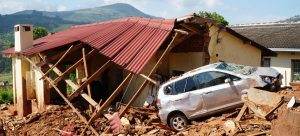The aid community must change their approach to face a new climate reality, avoid massive loss of life and protect millions of dollars’ of investment in development work.
The call, by Practical Action Southern African regional director, Kudzai Marovanidze, comes in the wake of Cyclone Idai, which caused unprecedented damage in the region.
Staff are reporting how thousands of people they work with in Manicaland in Zimbabwe and Chichiwawa in Malawi have lost everything. Entire villages will be forced to move after homes and infrastructure were wiped out by mudslides, storm water and flood debris.

A home destroyed by Cyclone Idai in Zimbabwe
Practical Action, working through the Zurich Climate Resilience Alliance in Bangladesh, Nepal and Peru, has demonstrated that lives and livelihoods can be saved if the most vulnerable communities are supported with the right approach and preparation.
Kudzai said: “Cyclone Idai is a stark and deadly reminder of the impact of climate change on the world’s poorest people.
“These incidents are becoming more frequent and more intense and we must ensure that climate resilience is at the centre of all future development work so that people have the skills, tools and knowledge to cope with, and recover from, disasters.
“If the aid community, along with national governments and international institutions like the UN and the World Bank don’t approach things differently, millions of dollars of investment will continue to be lost.”
Practical Action has a long history of building climate resilience into its programmes around the globe, ensuring the most vulnerable, hardest to reach people are prepared for crisis.
Solutions to help those at the front line of climate change, designed to help people cope with climate stress and emergencies include:
- ingenious infrastructure design,
- climate-smart farming techniques,
- community mobilisation and mock drill training,
- collaboration with governments and private sector actors,
Kudzai added: “Practical Action is in contact with communities on the ground and decision makers at international and national level, enabling us to bring the right people together for long term change.
“We have the experience to know what works in which context and the ability to bring together the right combination of solutions so people on the front line of climate change are equipped with climate resilient hardware and techniques.
“In this way when disaster hits they are better equipped to recover and preserve some of their belongings. Be that for slow onset disasters like drought, or flash flooding like Cyclone Idai.
“And we urgently call upon other agencies, governments and donors to join our strategic approach, rather than just mopping up the effects of climate change.”
Staff in Practical Action’s Southern Africa office are talking to donors and international institutions to try and bring about a similar climate resilient approach throughout the long process of rebuilding and recovery.